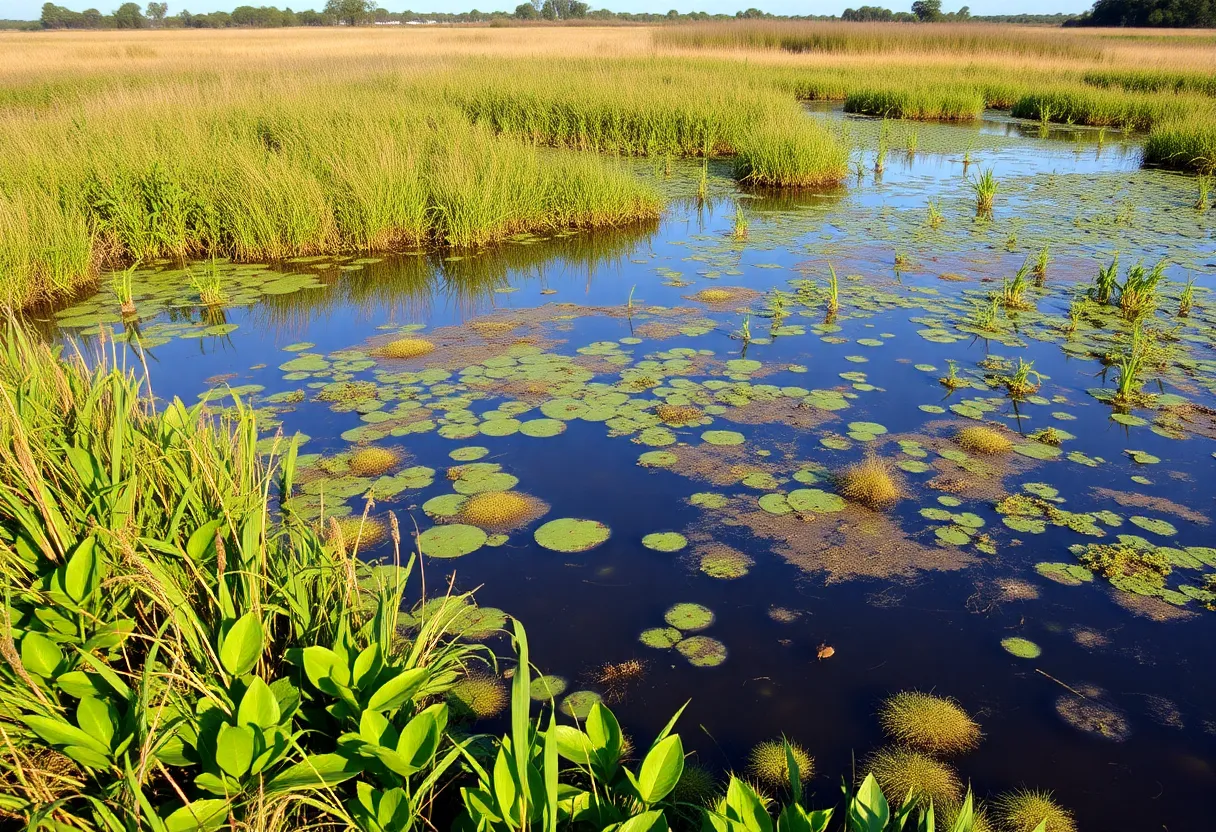News Summary
A federal appeals court has ruled that a hotel owner in Georgia can proceed with a controversial wetland development project, sparking concern among environmentalists and local residents. The ruling determined that the wetlands in question do not fall under federal protections. Residents have raised issues about infrastructure and traffic due to a new subdivision, while environmental advocates are worried about the implications for wetland protections following the Sackett decision. Additionally, Hyundai’s electric vehicle factory plans near Savannah remain unchanged following a reevaluation of environmental impacts.
Brunswick, Georgia – A federal appeals court recently ruled that a hotel owner in Georgia can move forward with a controversial wetland development project, a decision that has raised concerns among environmental groups and local residents. The ruling was issued by the US Court of Appeals for the Eleventh Circuit, which determined that the wetlands in question do not fall under federal protections established by the Clean Water Act (CWA).
In their case, the Glynn Environmental Coalition and the Center for Sustainable Coast argued that the wetland area contested was part of the “federal waters” protected by the CWA. However, the court concluded that the wetland’s proximity to a nearby salt marsh and creek was insufficient to warrant CWA protections. This ruling referenced standards set forth in the US Supreme Court’s 2023 Sackett decision that reshaped definitions around wetland protections.
The decision has sparked a backlash among residents of Effingham County, where plans are in place for a subdivision that would bring 504 new homes to an area already covered in wetlands. Many residents are expressing concerns regarding the adequacy of infrastructure and the potential for increased traffic caused by the new development. One resident, Toni Gaskin, has indicated that she may seek to appeal the ruling, voicing worries over road safety and infrastructure problems. Gaskin’s concerns include the lack of a completed traffic impact analysis for the proposed development and the anticipated high flood insurance costs for new homeowners in the area.
Another resident, Brittany Kochar, has encouraged her neighbors to engage with the appeal process, highlighting the importance of community involvement in addressing these critical issues. The fears of Gaskin and others are compounded by comments from Ben Kirsch of Ogeechee Riverkeeper, who pointed out the absence of adequate floodplain data and possible flooding risks linked to disturbing natural wetlands.
Meanwhile, newly elected County Chairman Damon Rahn expressed skepticism regarding the subdivision’s suitability for the area, but noted that there was little opportunity for meaningful discussion during the approval process for the project.
In related environmental news, it was also confirmed that Hyundai’s $7.6 billion electric vehicle factory under development near Savannah is not required to modify its water supply and environmental plans, following a reevaluation by federal regulators. The U.S. Army Corps of Engineers reaffirmed the validity of the factory’s 404 wetland permit, which was initially issued in October 2022. This reevaluation arose from environmental concerns about the potential impacts of four new wells in Bulloch County needed for the factory’s water supply. Local officials expressed satisfaction with the outcome, asserting that the reevaluation concluded Hyundai’s plans would yield “insignificant” environmental impacts.
Despite these reassurances, residents in the Savannah area remain wary, concerned about water availability and environmental effects on their communities. The Army Corps also stated that there would be no impacts on endangered species from the factory site. Kirsch, who serves as the legal director for Ogeechee Riverkeeper, is pursuing further clarity on the documents pertaining to this reassessment.
The recent ruling concerning wetland developments and the ramifications of the Sackett decision are fueling fears among environmental advocates regarding the future of federal protections for wetlands. As the U.S. Environmental Protection Agency (EPA) has created a new rule in the wake of the Sackett decision, uncertainties persist regarding the protections for wetland areas. Environmental advocates are closely monitoring the implications of the Sackett v. EPA decision and its future regulatory actions across the states, indicating a tense situation for both development projects and environmental preservation.
Deeper Dive: News & Info About This Topic
- Bloomberg Law: Georgia Hotel to Develop Wetlands After 11th Circuit Dismissal
- Wikipedia: Wetlands
- Savannah Now: Residents Still Reeling Over Decision to Build Homes in Wetlands
- Google Search: Wetland Development Issues
- AJC: Hyundai Metaplants Wetland Permit Valid
- Google Scholar: Wetland Protection Laws
- Savannah Now: Effingham County Commissioners Say Wetlands Concern for Development
- Encyclopedia Britannica: Wetlands
- Grice Connect: Hyundai Supports Sustainability in Coastal Georgia
- Google News: Hyundai Environmental Impact

Author: STAFF HERE AUGUSTA WRITER
The AUGUSTA STAFF WRITER represents the experienced team at HEREAugusta.com, your go-to source for actionable local news and information in Augusta, Richmond County, and beyond. Specializing in "news you can use," we cover essential topics like product reviews for personal and business needs, local business directories, politics, real estate trends, neighborhood insights, and state news affecting the area—with deep expertise drawn from years of dedicated reporting and strong community input, including local press releases and business updates. We deliver top reporting on high-value events such as Arts in the Heart Festival, Westobou Festival, and Masters Week. Our coverage extends to key organizations like the Augusta Metro Chamber of Commerce and Greater Augusta Arts Council, plus leading businesses in manufacturing and healthcare that power the local economy such as Textron Specialized Vehicles, Cardinal Health, and Nutrien. As part of the broader HERE network, including HEREAtlanta.com and HERESavannah.com, we provide comprehensive, credible insights into Georgia's dynamic landscape.


